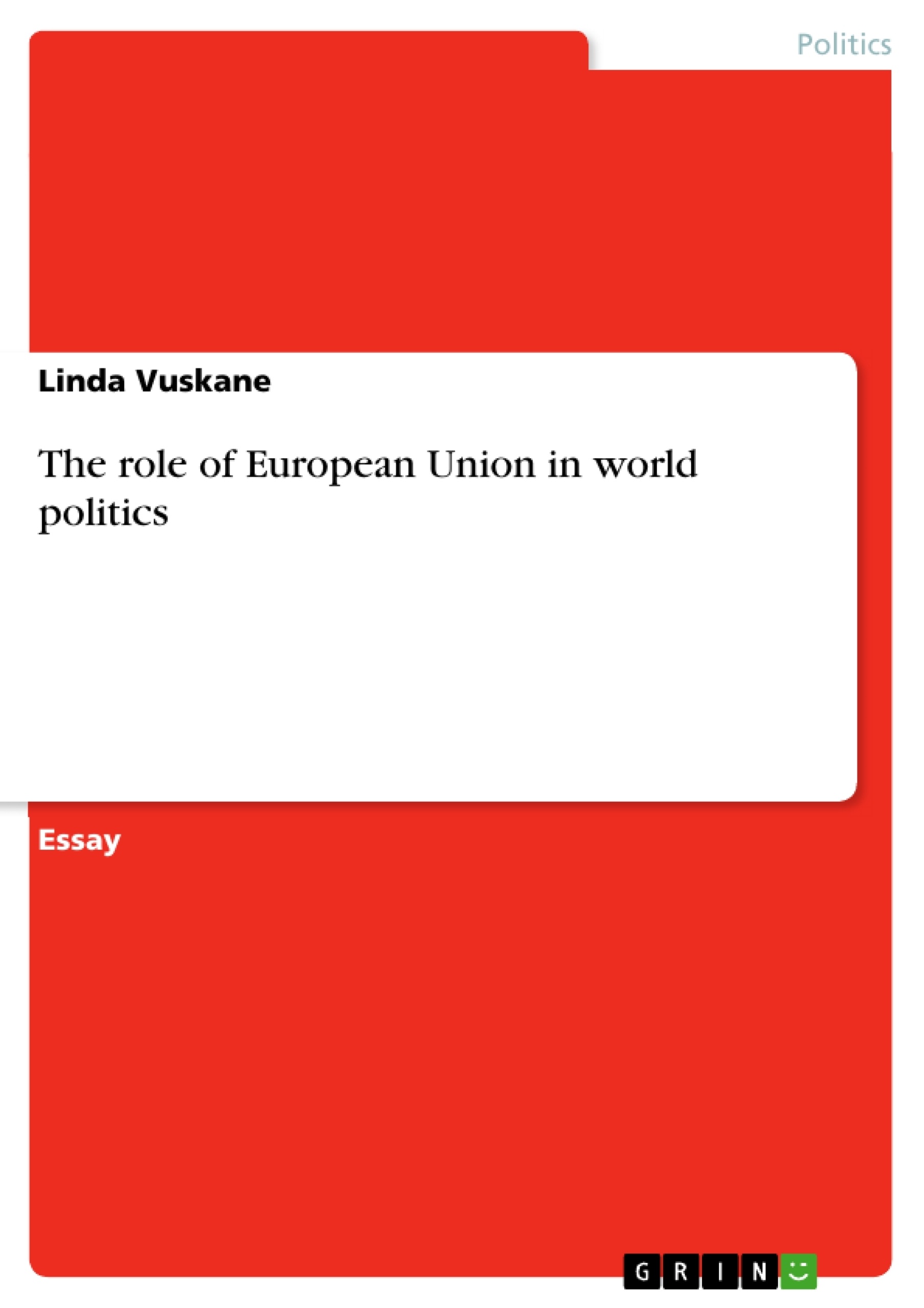It is widely agreed that the EU plays an increasingly important role in world politics. This essay will investigate to what extent is EU an actor in terms of its global economic, political and military role. It should be noted that these areas are not isolated and clearly separable. On the contrary, they are closely interrelated and often overlapping.
The essay concludes that the EU has a significant role in world politics in economic and to a lesser extent in political terms, however in military terms, EU has not been able or willing to develop strong foreign policy. While EU’s ability to translate its presence into actorness has been often criticised, it has nevertheless, assumed a leading role in many areas, such as development assistance, peacekeeping and environmental protection.
Table of Contents
- The role of European Union in world politics
Objectives and Key Themes
This essay examines the extent to which the European Union (EU) functions as an actor in global affairs, specifically analyzing its economic, political, and military roles. The essay recognizes the interconnected nature of these areas, acknowledging their overlap and interdependence.
- The EU's economic power and influence
- The EU's political influence in global affairs
- The EU's development and humanitarian assistance policies
- The EU's role in environmental politics
- The EU's military capabilities and foreign security policy
Chapter Summaries
The essay begins by highlighting the EU's significant economic power, evidenced by its substantial contributions to world trade, foreign direct investment, and global GDP. The creation of the Single Market and the Eurozone are discussed as key factors in the EU's economic prominence. However, the essay acknowledges that the EU's economic power has not always translated into corresponding political influence.
The text then delves into the EU's political role, emphasizing its extensive commercial and political relations with various organizations and countries worldwide. The Single Market is presented as a crucial tool for promoting European norms and standards, while the EU's development assistance policies are described as a cornerstone of its external policy. The essay notes that the EU has been a significant provider of development aid, particularly to African, Caribbean, and Pacific (ACP) countries.
The essay proceeds to explore the EU's humanitarian assistance programs, highlighting the EU's commitment to providing emergency aid, particularly through the European Community Humanitarian Office (ECHO). The essay acknowledges criticism regarding the politicisation of development and humanitarian assistance, suggesting that member states' material interests sometimes overshadow the EU's stated cosmopolitan goals.
The text further analyzes the EU's role in environmental politics, presenting the EU as a significant global actor in shaping and influencing policies in areas such as global warming and biodiversity. The EU's leadership in promoting sustainable development is discussed, particularly in relation to world trade, agricultural, and fishery regimes.
Finally, the essay examines the EU's military capabilities and foreign security policy. It acknowledges the EU's slow progress in developing a robust foreign security policy, often attributed to the prominence of the North Atlantic Treaty Organization (NATO) and the reluctance of member states to relinquish control over security matters.
Keywords
The primary keywords and focus topics of the text include: European Union, global actor, economic power, political influence, foreign policy, development assistance, humanitarian assistance, environmental politics, military capabilities, foreign security policy, ACP countries, Single Market, Eurozone, NATO, sustainable development, and cosmopolitan governance.
Frequently Asked Questions
To what extent is the EU an economic actor in world politics?
The EU is a significant global economic actor, contributing substantially to world trade, GDP, and foreign direct investment through the Single Market and the Eurozone.
Does the EU have a strong military role globally?
Compared to its economic power, the EU's military role is limited, as it has often been unable or unwilling to develop a strong, unified foreign security policy independent of NATO.
What is the significance of EU development assistance?
The EU is a leading provider of development aid, particularly to African, Caribbean, and Pacific (ACP) countries, using it as a cornerstone of its external political influence.
How does the EU influence environmental politics?
The EU takes a leading role in shaping global policies on climate change, biodiversity, and sustainable development, often setting international standards.
What is the role of the European Community Humanitarian Office (ECHO)?
ECHO is the EU's primary body for providing emergency humanitarian assistance and aid worldwide, reflecting the EU's commitment to global peacekeeping and relief.
- Quote paper
- Linda Vuskane (Author), 2011, The role of European Union in world politics, Munich, GRIN Verlag, https://www.grin.com/document/510577



